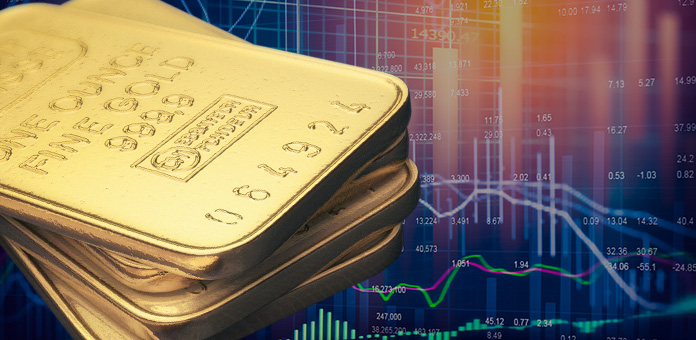 The gold market is higher on Monday as the new trading week gets underway. Although gold is higher by nearly $8 per-ounce in midday action, the market appears to be subdued and will likely remain that way until the conclusion of the FOMC meeting Wednesday afternoon. The Fed is widely expected to sit tight on interest rates this week, while still signaling its hawkish attitude.
The gold market is higher on Monday as the new trading week gets underway. Although gold is higher by nearly $8 per-ounce in midday action, the market appears to be subdued and will likely remain that way until the conclusion of the FOMC meeting Wednesday afternoon. The Fed is widely expected to sit tight on interest rates this week, while still signaling its hawkish attitude.
The notion of even higher interest rates may have kept gold at bay over the last several months. Despite even higher rates, however, the yellow metal could still rise, and rise substantially. The Fed is now being forced to walk a tightrope of sorts: Tighten rates too far or too fast, and a recession becomes increasingly likely. If they do not tighten rates enough, however, inflation will remain out of control and at multi-decade highs. Inflation has already become a major problem for U.S. households. Not only have energy prices been on the rise, but everything from a gallon of milk to a loaf of bread has also risen in cost. Households are needing to spend more, a lot more, just to maintain buoyancy.
That increased household spending will almost certainly take a bite out of the economy if it has not already. An increase in necessary spending could lead to a decrease in discretionary spending. The drop in essential spending could lead to declines in revenues for entertainment companies, travel companies, home improvement contractors and more. This too could lead the country into a prolonged recession and must be addressed before it is too late to prevent a recession.
Gold’s Versatility in Uncertain Times
Fortunately for gold investors, the yellow metal could rise whether a recession hits or not. A recessionary environment could lead to increased safe-haven demand for gold. A non-recessionary landscape could also lead to higher gold, as investors may be more willing to take on risk while diversifying their holdings. Either way, gold appears to be in a position to rise and possibly rise significantly from recent levels. An increase in the price of gold above the $2,000 level could signal a return to previous all-time highs or far beyond.
Interest rates and the Fed are not the only major issue affecting gold right now. There has been increasing chatter about the end of the U.S. Dollar as we know it today. The dollar has already lost the majority of its value since the Federal Reserve was created. What little value it has left could be disintegrated quickly and may very well do so if the U.S. debt problem is not somehow magically brought under control. A decline in the dollar is bullish for gold, as they tend to move in opposite directions. Dollar-denominated gold could move sharply higher on any major dollar news. As other nations have already begun to move away from the dollar as a preferred transaction currency, its days may be numbered.
👉 Suggested Read: Beware the Falling Dollar: Gold’s Position in the Future of the US Dollar
Bulls vs. Bears: The Battle for Gold’s Price Direction
The bears still control the market on the daily chart. The four-month old downtrend is firmly in place and the bulls have their work cut out for them to negate it. The first target for the bulls is the September highs around the $1,980 level. The next target would be the $2,000 level. The bears need to take out last Friday’s lows around $1,920 and then the $1,900 level before getting overly excited.
With the summer doldrums now behind the markets, price action in gold could pick up substantially in the weeks and months ahead. Market volatility may also increase while more bulls may come out of the woodwork to join in the market on the upside. The bulls will need some type of fresh catalyst, however, before being able to take over in sustainable fashion. That catalyst could take the form of a weaker dollar, lower interest rates or a recession.
“I’d be looking for higher [gold] prices as we move into the end of this year and into [2023] and beyond.”–Sr. Advisor Damian White


